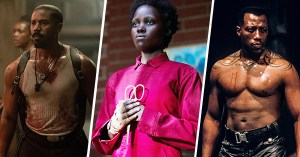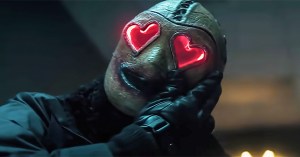James Franco’s 10 Best Movies
We count down the best-reviewed work of the director and star of The Disaster Artist.
He’s a performance artist, published author, gala host, former soap star, college student, professor, and one of the most prolific film actors currently working in Hollywood. This week, James Franco is keeping busy as the director and star of The Disaster Artist, which dramatizes outsider hero Tommy Wiseau’s efforts to bring his infamous The Room to the big screen, so we decided now would be the perfect time to take a fond look back at some of the brightest critical highlights from Franco’s bustling career. From indie flicks to blockbusters, he’s been in just about every kind of picture — and we’re ranking them here while inviting you to rank your own favorites. It’s time for Total Recall!
1.

(Photo by Monterey Media)
As if it weren’t enough that Memoria served as one of a whopping nine movies Franco released in 2016, it’s also based on a short story he wrote — all of which might make it sound like the vanity project to end all vanity projects, if not for the universally positive critical reception it earned during its limited release. Granted, at five reviews, we’re dealing with a limited sample size — at a certain point, Franco becomes too prolific even for people paid to watch the movies — but a rave is a rave, and this quiet character study about a troubled Bay Area teen earned its share, with its author’s supporting turn as a concerned teacher helping anchor the drama. “Despite clocking in at a scant 70 minutes,” wrote Michael Rechtshaffen for the Los Angeles Times, “Memoria manages to make a hauntingly poetic impression.”
2.

(Photo by Focus Features)
Sean Penn rightly received most of the many accolades afforded this 2008 biopic of assassinated political activist Harvey Milk, but director Gus Van Sant wasn’t content to let his movie rest on its star’s performance — he rounded out the cast of Milk with a number of actors whose seamlessly committed performances helped make it one of the most lauded films of the year. Franco fills a supporting role here as Scott Smith, Milk’s onetime lover (and, eventually, the executor of his will), who moves to San Francisco with him during the first act and helps him start his political career. Franco’s work earned him an MTV Movie Awards nomination for Best Kiss — and helped inspire Tom Long of the Detroit News to write, “Progress is slow, but Harvey Milk was one of the first to set the wheels in motion. He more than deserves a movie this good.”
3.

(Photo by Chuck Zlotnick/Fox Searchlight Pictures)
4. The Spider-Man Franchise (82%)

(Photo by Columbia Pictures)
Long before Tom Holland swung into the MCU as Spider-Man, Tobey Maguire brought Marvel’s wall-crawler to the big screen in director Sam Raimi’s blockbuster trilogy — and Franco joined the core ensemble cast as Harry Osborn, Peter Parker’s best pal and the future Green Goblin. Harry’s tortured arc helped form the backbone of Raimi’s overarching narrative throughout the three films, and although Spider-Man 3 proved a dissatisfying low note for the end of this chapter in Spidey’s big-screen life, the movies together helped pave the way for the looming great golden age of superheroes at the box office; more importantly, as Mick LaSalle observed for the San Francisco Chronicle, they offered “Smart, fun entertainment made by people who took nothing for granted, including the audience.”
5.

(Photo by Suzanne Hanover/Sony Pictures)
If an actor is playing themselves in a movie, should it count as one of their best performances? More often than not, we’d say no — but we’re making an exception for the gloriously loopy This Is the End, in which some of Hollywood’s sharpest young talent play exaggerated (or straight up invented) versions of themselves against the backdrop of the apocalypse. The end of the world, naturally, is witnessed from Franco’s abode, where he’s hosting a house party (including Seth Rogen, Danny McBride, Jonah Hill, and Emma Watson) when things go haywire. The end result, while decidedly not for all tastes, hits its comedic targets far more often than it misses; as Dana Stevens observed for Slate, “This Is the End, true to its subject matter, is as funny as hell.”
6.

(Photo by 20th Century Fox Film Corp.)
7.

(Photo by Paramount Pictures)
In addition to taking a supporting role, Franco also donned his producer’s hat for Goat, a harrowing drama from director/co-writer Andrew Neel about a college freshman (Ben Schnetzer) whose efforts to fit in on campus include pledging his older brother’s fraternity — a fateful decision that soon goes violently wrong, further complicating a young life already shadowed by horrific violence. Like a good number of Franco’s film efforts, it was destined for limited release and aimed outside the mainstream, but for many of the critics who screened it, this hard-hitting coming-of-age story — distinguished by a scene-stealing turn from former pop idol Nick Jonas — proved difficult to shake. “This isn’t an easy film to watch,” admitted the Washington Post’s Stephanie Merry. “But it’s even harder to forget.”
8.

(Photo by Monterey Media)
One of several films drawing from Franco’s 2010 short story collection Palo Alto, this 2015 indie drama weaves together “Yosemite” and “Peter Parker,” a pair of stories from the book, to observe moments in the lives of three fifth-grade boys in 1985. As with other Palo Alto-derived movies, Franco produced and starred but didn’t write or direct; here, he handed the reins to writer-director Gabrielle Demeestere and appeared in one segment as Phil, a father taking a trip to the titular park with his son (Everett Meckler). While certainly not one of his more widely seen efforts, it ranks among his most satisfying for the majority of critics who reviewed it — including the Village Voice’s Alan Scherstuhl, who wrote, “Yosemite mines Franco’s fiction for its most vital quality: his unsentimental depiction of youthful insecurity, this time among fifth-graders.”
9.

(Photo by First Look International)
10.

(Photo by Warner Bros. courtesy Everett Collection)
In this Paul Haggis drama, Franco took a supporting role alongside Jason Patric as one of two politely dismissive Army officers who interfere with the efforts of a grieving father (played by Tommy Lee Jones) to uncover the facts of his son’s gruesome murder. Though its Iraq War overtones didn’t do it many favors with audiences, and some critics felt Haggis took an excessively heavy-handed approach, most were able to appreciate In the Valley of Elah’s message — and the hard questions it asked in a time of war. “After the potent final image faded to black,” wrote Aisle Seat’s Mike McGranaghan, “I had that very special tingle I get when I know I’ve just seen a great movie.”









